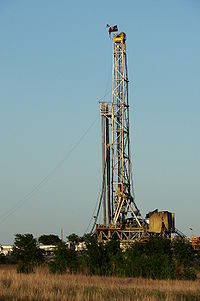| Fracking |
|---|
 |
| By country |
| Environmental impact |
| Regulation |
| Technology |
| Politics |
Fracking in the United Kingdom started in the late 1970s with fracturing of the conventional oil and gas fields near the North Sea. It was used in about 200 British onshore oil and gas wells from the early 1980s.[1] The technique attracted attention after licences use were awarded for onshore shale gas exploration in 2008.[2][3] The topic received considerable public debate on environmental grounds,[4] with a 2019 high court ruling ultimately banning the process.[5] The two remaining high-volume fracturing wells were supposed to be plugged and decommissioned in 2022.[6]
Although fracking is often used synonymously to refer to shale gas and other unconventional oil and gas sources, it is not always correct to associate it with unconventional gas.[7]
- ^ Cite error: The named reference
RAEreportwas invoked but never defined (see the help page). - ^ British Geological Survey (2010). The Unconventional Hydrocarbon Resources of Britain's Onshore Basins - Shale Gas (PDF). Republished 2012. Department of Energy and Climate Change. Retrieved 17 April 2013.
- ^ Cite error: The named reference
BBC 20Jan2011was invoked but never defined (see the help page). - ^ "What is fracking and why is it controversial?". BBC. 16 December 2015. Retrieved 20 December 2016.
- ^ "Government fracking policy declared unlawful by High Court". The Independent. 6 March 2019. Retrieved 6 March 2019.
- ^ "Fracking firm Cuadrilla to permanently abandon UK shale gas sites". TheGuardian.com. 10 February 2022.
- ^ Reid, Alasdair (24 October 2013). "Unconventional Gas in Scotland" (PDF). SPICe Briefing. 68 (13). SPICe. Retrieved 8 November 2014.
